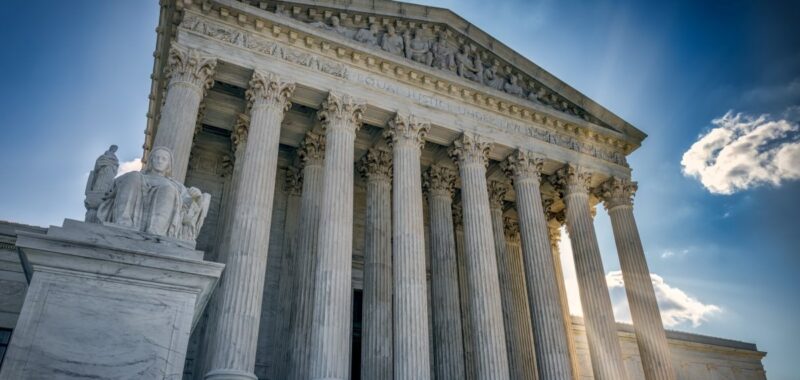On Friday, the nine justices of the U.S. Supreme Court will meet and decide whether to weigh in on the legal battle between the National Association of Realtors (NAR) and the Department of Justice (DOJ).
A docket entry for the case lists Jan. 10 as the conference date for NAR’s writ of certiorari filed in October. The court’s website shows that it will post its decision on Monday, Jan. 13.
The legal battle dates back to 2018, when the DOJ opened an investigation into NAR’s now-defunct Participation Rule and its current Clear Cooperation Policy. The two parties reached an initial settlement in 2020, which required NAR to boost transparency about broker commissions and to stop misrepresenting that buyer broker services are free. In exchange for NAR’s compliance, the DOJ said it would close the investigation.
But the DOJ, under new leadership in the Biden administration, withdrew the settlement in July 2021. It stated that the terms of the agreement prevent regulators from continuing to investigate certain association rules that could harm buyers and sellers.
NAR filed a petition in September 2021 to set aside or modify the DOJ’s probes into the trade group.
In January 2023, U.S. District Court Judge Timothy Kelly ruled that the terms of the settlement were still valid and that allowing the investigation to continue would take away the benefits NAR had negotiated in the original settlement.
The DOJ appealed the ruling in March 2023. In April 2024, the U.S. Court of Appeals for the District of Columbia Circuit reversed Kelly’s ruling, permitting the DOJ to reopen its investigation.
In a response to NAR’s writ of certiorari, the DOJ wrote that it did not agree to close its investigation as part of the 2020 settlement. In a reply filed in late December, NAR took issue with this and other claims the DOJ made, including that the agency still had the ability to reopen its investigation into NAR after it had agreed to close the probe as part of the settlement.
NAR also reiterated its belief that allowing the DOJ to reopen the probe sets a dangerous precedent that the government does not have to uphold its contractual promises.
“If left in place, the decision below will unsettle the interests of the diverse private parties who routinely contract with the government, from sophisticated firms vital to our nation’s economy to criminal defendants confronted with the government’s vast prosecutorial advantages,” NAR’s response states.
“The decision below also risks eroding the government’s sovereign capacity to vindicate national interests through contracts, a concern that transcends the government’s desire to escape the particular settlement at issue here.”
The trade group also took issue with the DOJ’s claims that it did not commit to not reopen the investigation in the proposed settlement, and that the D.C. court of appeals’ interpretation of the agreement as such was the result of “special treatment.”
“The D.C. Circuit afforded the government special treatment precisely by determining — th[r]ough various improper thumbs on the interpretive scale — that it made no commitment to refrain from reopening the investigation,” the filing states. “Without such deferential treatment, DOJ could not have succeeded with its brazen reinterpretation of the settlement agreement.”
In order for the Supreme Court to hear the case, four of the nine justices must accept it. In total, the court typically accepts about 100 to 150 cases of the 7,000 petitions it receives each year.

